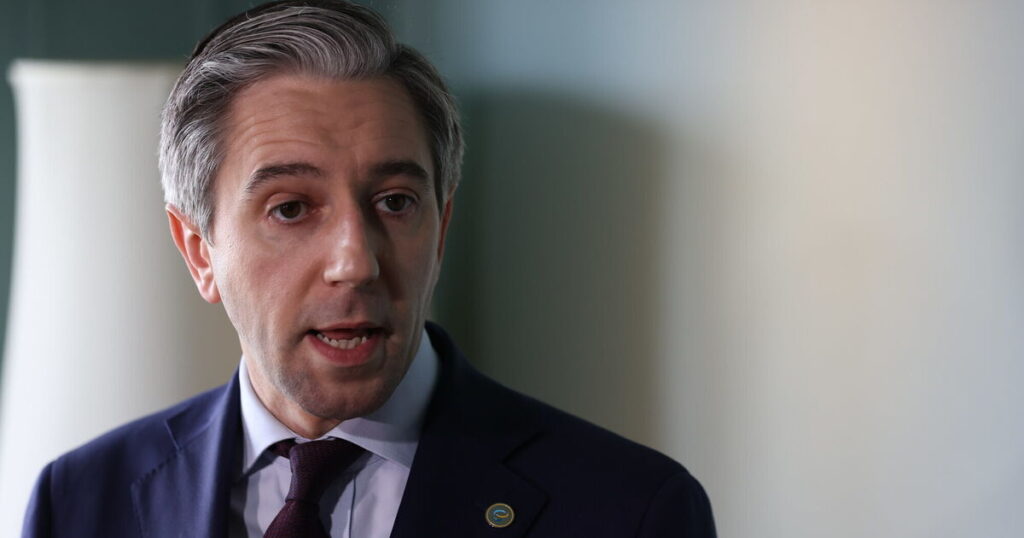Fifteen Irish citizens have been successfully evacuated from Israel, Tánaiste Simon Harris has confirmed.
Mr Harris said the 15 Irish citizens, including dependents, crossed the border earlier on Sunday and would return to Ireland in the “coming days”.
“Throughout this crisis, the Department of Foreign Affairs and Trade and our Embassy in Tel Aviv have remained in regular contact with Irish citizens in the region. We have worked closely with our EU and other partners to exchange information and coordinate our consular response to the situation,” Mr Harris said.
The Tánaiste thanked the Austrian government for their “close cooperation”, which enabled the evacuation.
He added that any Irish citizens living in either Iran or Israel should “remain vigilant” and monitor developments, as well as follow advice from local authorities.
Mr Harris said Ireland’s embassies would be in close contact with all civilians remaining in both Israel and Iran over the days and weeks ahead.
Earlier on Sunday, the Tánaiste confirmed there were a number of citizens in Iran who wished to be evacuated, with work underway to try and get them out of the country.
The Government is working to evacuate a number of citizens from Israel and Iran, with approximately 200 based in the former and 29 in the latter.
“It’s not easy work as you can imagine, the airspace is closed and the only way of being evacuated is over land border with often long journeys that are not without difficulty and not without danger,” Mr Harris said.
The Fine Gael leader said the actions of the US President overnight had “added a new layer of complexity and volatility to an already very dangerous tinderbox”.
He added there is a “real risk of spillover” in the conflict that could see it escalate into a further regional war.
“There is a real risk, by either a miscalculation or by intent, that already a very dangerous conflict spreads between the two countries involved,” Mr Harris said.
Mr Harris also raised concerns about the possibility of oil routes being shut down, which would be a “further economic worry”.
The Tánaiste also confirmed his call with the Iranian deputy foreign minister, Majid Takht-Ravanchi, saying he was “full of anger” over the attacks by Israel and the US.
Mr Harris said Mr Takht-Ravanchi outlined the Iranian position that the US and Israel would need to “learn lessons and pay a price”.
He said the Government would continue to push for negotiations to end the war, adding there was “no alternative” to diplomacy.
It comes ahead of a meeting of EU foreign ministers on Monday, with discussions set to be dominated by the escalating war between Israel and Iran.
There is an urgent need to “de-escalate” tensions in the Middle East after the US carried out strikes against Iran, Taoiseach Micheál Martin has said.
Mr Martin called on “all actors” in the Middle East to de-escalate the situation.
“Diplomacy and dialogue is ultimately the only way to resolve these issues. Iran should commit not to develop nuclear weapons and disavow its nuclear and uranium enrichment programme,” Mr Martin said.
“Nuclear safety is an issue here. Modern warfare is very destructive. It is civilians who ultimately suffer and that is why we need an end to these wars and an end to conflict.” Speaking to RTÉ, Mr Martin said the world should not forget about “the catastrophe that is still unfolding in Gaza” while the war between Israel and Iran is ongoing.
Tánaiste Simon Harris said he was “closely monitoring” the situation in Iran after the overnight strikes by the US.
It is understood that Mr Harris has spoken with the Iranian deputy foreign minister, Majid Takht-Ravanchi, after the overnight attacks.
The call took place due to a request from Iran’s government, with similar calls also taking place between Iranian officials and counterparts in Saudi Arabia, Jordan and Egypt in recent days.
Mr Harris was said to have expressed “grave concern” at the overnight escalation, while adding it was important Iran engaged in formal talks to de-escalate the conflict.
“The risk of an extremely dangerous spiral of escalation in relation to Iran and Israel is now more real and more likely than ever before,” Mr Harris said.
“There is an urgent need for de-escalation, dialogue and diplomacy.”
Mr Harris said: “Europe, including Ireland, is fully united in the clear view that Iran should not be allowed to possess nuclear weapons.
“The way to address this was always through a negotiated solution. Any alternative to that is simply too dangerous for civilians, for the Middle East region and for global security.”
He added that discussions would be taking place among EU foreign ministers in the hours ahead to consider “the next steps Europe can usefully play to support de-escalation”.
Mr Harris added he is aware of the large contingent of Irish peacekeepers in Southern Lebanon, saying he is receiving regular updates from the chief of staff of the Defence Forces.
Mr Harris said the US President’s actions have resulted in an “extraordinarily dangerous escalation of a conflict that could already be described as a tinderbox”.
“I need to be very clear and very blunt. We’re now entering a moment of particular danger, because I think the chances now of a spiral of escalation are more likely than ever before,” Mr Harris said, speaking on RTÉ Radio’s This Week.
“There is a real chance of the international community losing all control of this very, very volatile conflict.”
Asked if international law norms have gone out the window, Mr Harris said it was “sadly true”.
“The only way this will be resolved and the only way really people can step back from the brink now is through de-escalation, diplomacy and dialogue,” Mr Harris said.
On Irish citizens seeking to leave Iran, Mr Harris said it was an “ongoing situation” but he would have a significant update later on Sunday.


